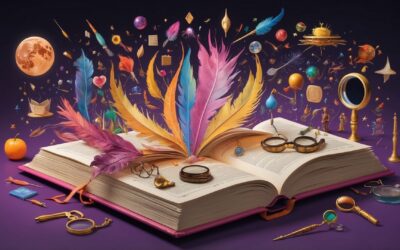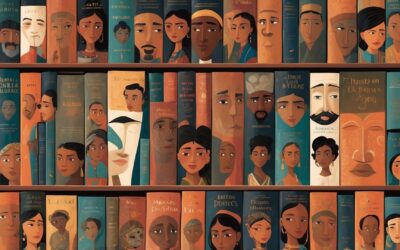In a world long before the hum of machines and the glow of screens, humans sat huddled around crackling fires, bathed in their golden light. It was in these primal settings that our ancestors began to weave tales, to give voice to thoughts, dreams, and the intricate dance of human experience. These stories, passing from lips to ears, were the world’s first literary medium – the oral tradition. This is a tale of how those spoken stories would evolve, embarking on a chronological journey that would lead to today’s eBooks.
Oral Traditions: Memories Etched in the Mind, not on Paper
The ancients did not have the luxury of pen and paper. Instead, they had prodigious memories and an exquisite artistry for rhythm and rhyme. These tools helped them recount epic sagas of gods, heroes, love, and treachery. From the Aboriginal dreamtime stories in Australia to the great epics of Homer in Greece, oral traditions formed the bedrock of our earliest cultures.
It’s fascinating to ponder how a community’s shared memories, values, and beliefs were maintained purely through spoken word. These tales were not just idle pastimes; they were invaluable cultural records, preserving history, moral codes, and scientific knowledge. Epic storytellers were both revered and indispensable.
The Dawn of Writing: Casting Stories in Stone and Clay
Then came a revolution – the invention of writing. In ancient Sumer, around 3200 BCE, cuneiform inscriptions began to appear on clay tablets. Meanwhile, in ancient Egypt, hieroglyphs were being chiseled into stone. These symbols were not just mundane records of trade or decrees; they were also narratives, hymns, and poems. Writing meant that a story, once set down, could cross time and space, untouched by the frailties of human memory.
Papyrus to Parchment: The Precursors to the Book
As writing evolved, so did the mediums. The Egyptians discovered the art of making papyrus sheets, leading to the creation of scrolls. But in the parched landscape of the Middle East, papyrus was hard to come by. Thus, parchment, made from animal skins, became popular. These innovations transformed literature, allowing for more extensive collections of knowledge and the birth of libraries, such as the famed Library of Alexandria.
The Middle Ages and the Manuscript
Enter the Middle Ages. Monks in secluded monasteries would spend years meticulously copying texts by hand onto manuscripts, often embellishing them with intricate designs and illuminations. These books were rare, revered treasures, and only the elite had access to them.
The Printing Press: Knowledge for the Masses
The winds of change blew in the 15th century with Johannes Gutenberg’s invention of the printing press. This groundbreaking invention meant that books were no longer exclusive to the elite. Knowledge could be mass-produced and disseminated far and wide. The world would never be the same.
The Modern Book: Birth of the Paperback
As centuries rolled on, the hardbound book became a household staple. But it was the 20th century that witnessed the birth of the paperback. Affordable and portable, these books truly democratized reading, ensuring that literature was within everyone’s grasp.
The Digital Age: eBooks and Beyond
Fast forward to the 21st century. In the span of a mere few decades, technology has revolutionized our relationship with literature. eBooks, with their ability to store an entire library in one’s pocket, became a sensation. The physicality of the book was no longer a constraint, and the world reveled in this newfound freedom.
However, the eBook was more than just a digital version of its paper counterpart. It introduced interactive elements, hyperlinks, multimedia integrations, and customizable fonts and backgrounds. The line between author and reader began to blur with interactive narratives and reader-driven story outcomes.
The Future: A Fusion of Old and New?
As we stand on the brink of new technological frontiers, one can’t help but wonder – what’s next? With augmented reality and virtual reality becoming mainstream, will our reading experiences become more immersive? Will we return to the days of shared storytelling, but this time in virtual communal spaces?
While the mediums of literature continue to evolve, what remains constant is our intrinsic need for stories. From oral tales whispered under starry skies to sprawling digital narratives experienced in virtual realms, our journey has been long and transformative. But at its heart, whether spoken, written, or digitally rendered, the story remains an indelible part of the human experience. And as we’ve learned from our journey through time, no matter the medium, a good story endures.
Keywords
- Oral Traditions: The practice of passing down stories, history, and knowledge through spoken word, rather than written text.
- Prodigious: Remarkably or impressively great in extent, size, or degree.
- Cuneiform: An ancient system of writing, first developed by the Sumerians, using wedge-shaped marks made in clay tablets.
- Hieroglyphs: The formal writing system used in ancient Egypt, often characterized by its use of symbols and pictographs.
- Papyrus: A material prepared in ancient Egypt from the pithy stem of a water plant, used in sheets for writing or painting on.
- Parchment: A stiff, flat, thin material made from the prepared skin of an animal, typically a sheep or goat, and used as a durable writing surface.
- Manuscript: A book, document, or any piece of music written by hand rather than being printed or reproduced in some other way.
- Illuminations: Decorative designs or illustrations, often made with gold or silver, accompanying text in medieval manuscripts.
- Democratized: Made accessible to everyone, rather than being limited to certain groups or individuals.
- Augmented Reality: A technology that overlays digital information on the real world as seen through a device, like a smartphone or augmented reality glasses.
Key Takeaways
- Stories have evolved from being orally passed down to digitally rendered over the centuries.
- Before writing, human history and culture heavily relied on oral traditions.
- The invention of writing marked a significant shift in preserving and sharing knowledge.
- Papyrus and parchment were early materials that made the creation and preservation of texts possible.
- The printing press revolutionized literature by making it accessible to the masses.
- The 20th century saw the rise of the paperback, further democratizing access to literature.
- The 21st century introduced eBooks, revolutionizing the way we read and interact with texts.
- The future of reading could blend old traditions with new technology, creating immersive experiences.
Check out the Story of Literature Article Series
The Story of Literature: Delving into Humanity’s Timeless Narratives (Featured Article)
From Campfire Tales to Digital Screens: The Evolution of Storytelling
Drama through Time: From Ancient Shadows to Modern Stages
The Mesmerizing Power of Novels: A Deep Dive into Our Fascination with Long Narratives
Echoes of Society: The Deep Interplay between Literature and Cultural Values
Navigating the Digital Revolution: How Literature Evolves in a Tech-driven World
Universality in Literature: Uniting Hearts and Minds Across Cultures










0 Comments